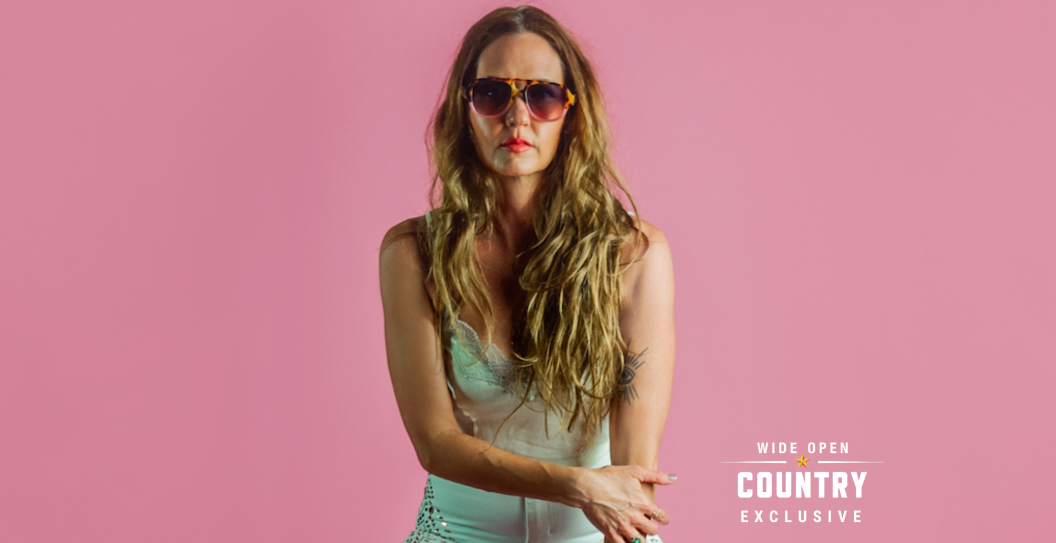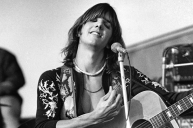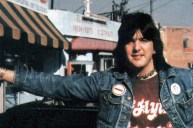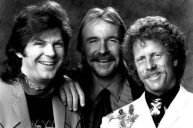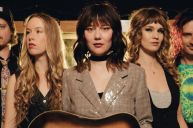Florida singer-songwriter Van Plating flipped through a local magazine when she came across an article about Polk Country musicians of the 1960s and '70s. One of those names was Jon Corneal, a drummer known for his pioneering work in the country-rock sphere - The Flying Burrito Brothers and The International Submarine Band among his many contributions. The story also named checked the likes of songwriter Bobby Braddock, Gram Parsons and Pam Tillis. Plating's interest was piqued.
Videos by Wide Open Country
"With all these different folks, I either knew their music and didn't know they were from here or just didn't know about them," she tells Wide Open Country. "I started putting some of those puzzle pieces together in my brain, especially when I looked at some of those different folks and how often a lot of those people were left of the mainstream in their sound."
From this early research, Plating began stacking together colorful musical pieces into a brilliant mosaic of what her new album, Orange Blossom Child, would become.
"I knew that the songs came first, like actual the skeletons of the song. So, the melody, the lyrics, and the chord progressions were very autobiographical," she explains. "Then, when it came to getting the sounds on the song, I really wanted to just mine everything that either was something that predated me and that I sort of grew up on in early childhood, those bluegrass sounds, or were the sounds of late '60s, early '70s southern rock and roll - all the way up through the nineties sounds when I was an adolescent. You know, your Tom Petty or John Anderson, all of that. So I pulled specifically from those color palettes and instrumentation."
Wide Open Country caught up with Van Plating to discuss her new record, grief, literary influences, and wearing her heart on her sleeve.
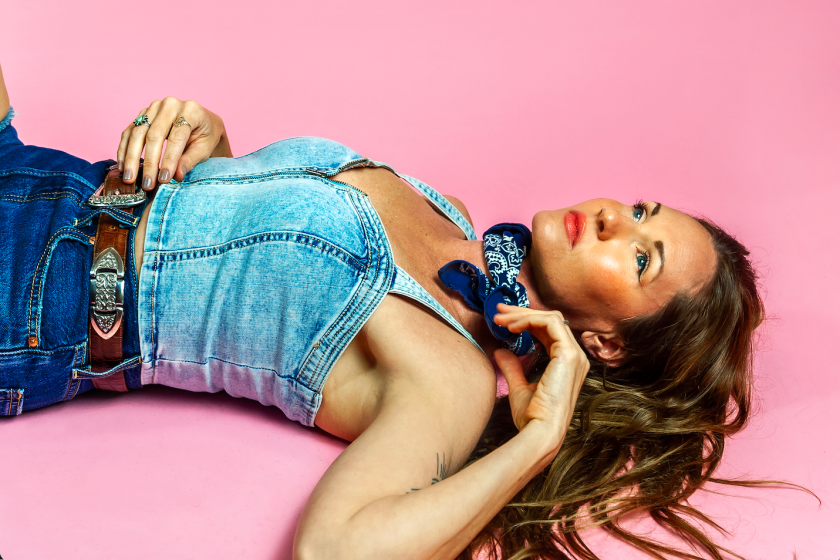
Sara Brewington Baarnes
What makes Florida-made music so special?
I think it's a willingness to be a little different. It is such a melting pot. In many ways, there's a certain moodiness to it that's just a little bit different. At least, it hits a little different for me. You go with your Gram Parsons, the cosmic country stuff, and here's a little bit of a dark melancholy underneath it that's also related to Tom Petty stuff. It's also got a little bit of an edge. There's something about living in a land where dinosaurs still walk around and you could get flattened by a hurricane at any point - there's a certain tenacity to people from here. The fact is we laugh because life down here is no joke. It's hard.
There's a lot of poverty, it's not a chill place to come up now. Lots of people move from other places and come here. Especially here I grew up, in rural Florida, it's very different than tourist/suburban Florida, even though it wasn't that many miles apart.
The album tells stories about your family. What did you learn in writing this record?
That song I wrote about my mom, "Joel called the Ravens," I really wasn't sure how she was gonna feel about me writing those things down, especially because I didn't even know that she had gotten married and divorced until I was 25 years old. That had been kept a secret from me and my brother our whole life. She carried a lot... I don't want to put words in her mouth, but it seemed like she carried a lot of shame with her. None of that was her fault. You know, women couldn't even file for a divorce when she had to get divorced from this man who was just awful to her. It was really a tough experience that she walked through, and they were very much below the poverty line growing up. She had a really hard life. When I wrote that song, you don't know when you're singing someone else's life back to them... how's that gonna feel?
I looked at her and played that song for her before I recorded it. She had tears in her eyes, and I asked her if she liked it or if it made her uncomfortable. I wanted to know if it would be OK. It felt so important to all the other stories, and I'm so proud of her and what she's walked through. She looked at me, and she said it was all true and that she loved it. It felt really good hearing that story sung back to her in that way.
You feature everyone from Reckless Kelly and Elizabeth Cook to Crystal Bowersox and Ottoman Turks. How did this album become an album of collaborations?
[Laughs] Everybody said yes. I wasn't expecting that. I had all the sessions built out. The mixes sound exactly like they sound now except they didn't have any of the guests in yet. I always enjoy it when artists bring guests onto albums. It just adds something special. I was thinking maybe two or three people would say yes. So you put out a bunch of asks thinking you'll get two or three yeses. And then I got eight yeses. What a weird problem, right? It's not a problem. But what a weird funny moment that happened. The relationship I have with my fans and my followers, and the relationship with all my collaborators has been such a thread throughout this whole process. I figured, "Well, everyone said, yes, I'm not gonna tell anybody no. I'm just gonna say, let's make it a party because why not?"
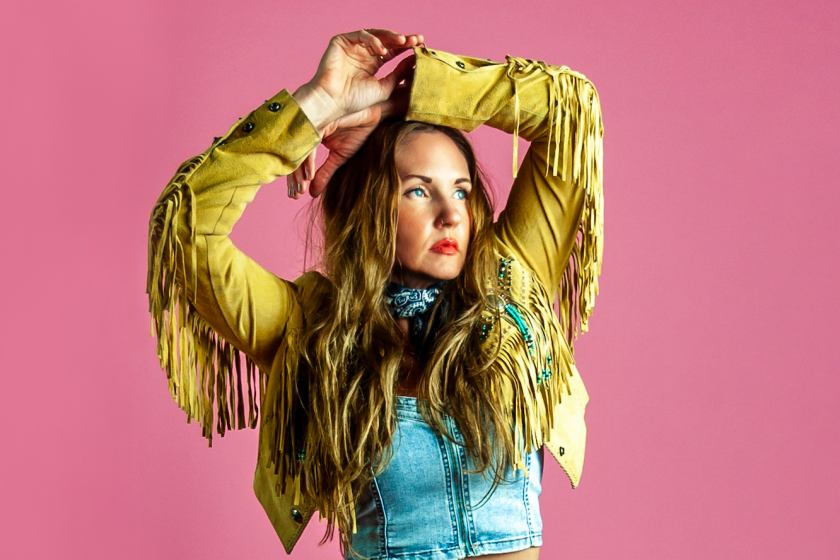
Sara Brewington Baarnes
"Hole in My Chest (Big Feelings)" is among the most interesting songs on the record. It begins largely acoustic before other instruments dip into the arrangement. Why did it make sense to be so minimalistic here?
I actually rewrote it. That song originally was gonna be much more of like a big vocal moment, and I had a whole other arrangement for it. I felt like the way I was performing was taking away from the real impact of the lyrics. I felt like it was too cheesy. So, I sat down one night and I was like, 'What can I do that's different? That would make me feel these words?' I rewrote it in five minutes and thought to myself, 'Why didn't I do this the first time? This totally fits.' This one is a pandemic song, written in my bedroom on a hard day when everybody was stuck under one roof and we were all scared and nobody knew what life was gonna look like. We were all in limbo. It's really a song about letting yourself sit with all the feelings that you're feeling and just giving yourself space to hold all of that. Once I rewrote it, I said, 'Oh ok if I stack too much on this, it's gonna ruin it. I need to keep it like really emotive and raw and have the vocals be up close.'
Speaking of big feelings, are you one who wears their heart on their sleeve?
I'm not outwardly. People tend to think I'm so quiet and chill. I really am outwardly, but I feel everything on such a deep level. It can be exhausting.
With "Big Time Small Shot," what is most striking is the way you sing some of the lyrics, particularly the verse that begins "word travels fast down Interstate 4."
That song came tumbling out really quickly, and it's because I put on a vibe. I grew up on Johnny and June, and the way my granddad and his brothers talked when they were in the picking circle and they were singing and saying songs. That speech-song style is very prevalent in old-school country music. I started playing around with it, and it just came out. My husband was in the other room, and he said, "What are you doing?" I was like, "Don't disturb me. I'm having a moment."
I shared that with my friend Will Payne Harrison and he was like, "How are you doing that?" And I said, "Well, I grew up on this stuff... the indie-Americana thing." Those kinds of inflections come really naturally, and it makes that song very fun to perform. I'm not really thinking about it. I'm living the story, and when you're in a live room with that song, in particular, people just lose it.
In one of many collaborations, you enlist Crystal Bowersox for "Jesus Saved Me On the Radio." How did you two cross paths?
I really wanted someone singing harmony with me on it. I could hear where I wanted it to happen. I started looking for guy singers to sing with me, and a couple of my friends gave it a try. It didn't feel right to them; it didn't feel right to me. One day I was just listening to Spotify and one of Crystal's songs comes on. I'm texting back and forth with my publisher, who helped me with some of the connections, and I mentioned Crystal. He goes, 'I talked to you about Crystal months ago. What do you mean?' I was like, "Did you, really?" And he was like, "Yes I did."
He is really good friends with some close friends of hers who are also her fans, and they connected us. I talked with her sometime right after she had left the road, and she was home. I just told her how much I loved her voice and [asked] if she'd be willing to contribute. And I'd sent her the song. She's such a cool person, and the vocals are insane. Beyond that, she's a beautiful human being, and I love what she's about. She really vibed with the song. It just really works with her style. I get goosebumps when her vocal comes in with on that song every time.
The song has some of my favorite words on the record, such as mockingbird, synthetic, and whippoorwill. In your process, do you spend a lot of time swapping out words?
I did some on this song. Some of it was setting a scene. I'll get a draft down, and then I go back through and I say, "OK, what can make me feel something just a little bit more?" It's really curating the words. With this song, I was really thinking about this essay by Annie Dillard called "Teaching a Stone to Talk." She's this intense writer, and she goes for the throat. She's got some intensity to her. She'll go through describing this whole scene, and the essay is about this lunar eclipse. Somehow by the end of the essay, she's not just talking about this lunar eclipse. She's talking about the endlessness of the march of humanity across time and how heartbreaking and beautiful that is. It just sits with you. I was thinking about that and thinking about my experiences of growing up in a youth group and all these big questions. Some of those questions were not questions that anyone wanted to hear back then. With synthetic carpet, I was thinking about the youth group room where we would have youth choir practice and my dirty converse sneakers that were made of plaid couch material.
And I had one of those little promise rings back then. So it's "dirty sneakers and the diamond ring singing hallelujah on synthetic carpet." I was thinking about all the questions, and how many of my deeper experiences happened back then. When you have the freedom to ask each other hard things and know that the other person who's listening is a safe space for you to ask those questions, it's a place that's not about judgment but about empathy and hearing each other. That's where that song came from. I was getting to live in this beautiful place with these people that I knew cared about me, even while at the same time, some really hard and awful things were happening in our community. I was thinking about the duality of it all and how it all coexists.
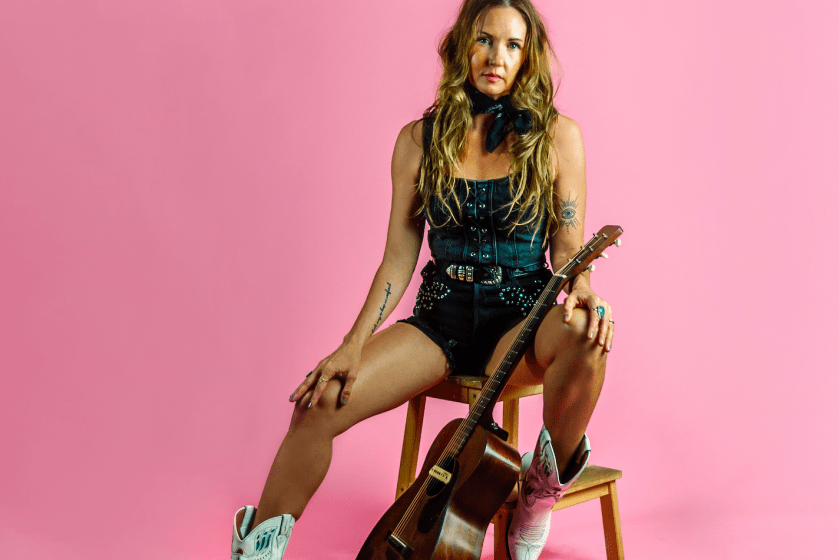
Sara Brewington Baarnes
Who are some of your other literary influences?
I would say, lyrically, my influences are much more literary than musical. I tend to take from Annie and Wendell Berry. Wendell's work is completely stunning. He taught me so much about setting a sense of place and different descriptors for what love means from different perspectives. A lot of his writing is set in teeny tiny rural towns. On the other side of that, Patti Smith - I love her writing. I love the way she just takes these mundane everyday things, and it becomes poetic the way she shares just the beauty in the everyday. And Mary Oliver would be my other one. I keep her books out in the studio because sometimes I need a kick in the butt.
With the album's title track, you pay tribute to a friend who died. How are you dealing with your grief now?
Man, I wish she was still here. She was sick for a long time. I wrote this song, and she passed away right before AmericanaFest last year. The first time I ever played this song in front of anyone was at the Black Opry House last year. One night, Holly G. kind of threw a guitar at me, and I played this song. It was sort of one moment where I kind of felt like I was processing what had happened... losing her. We didn't see each other in recent years, but we kept in touch. In childhood, those folks that grow up with you, there's something different about those friendships. She kept in touch with me, and she had a really hard life. Ever since I started writing music again, five years ago, she was so supportive. I felt like I was chasing both of our dreams in a way... I'm gonna get choked up. She never got to do most of the things she wanted to do. So I feel like I owe it to her to chase this as far as I can with the most excellence that I can. I'm still processing it obviously because I'm crying on the phone. I carry her around with me.
Zion often references the hill of Jerusalem, heaven, or any holy place. What does it mean for you in "Zion is a Woman"?
My perspective on writing this song is one of being a life-giver and the cost of loving. One of my best friends was reading a book about Lent, and she said, "Did you know that the way we translate that word isn't necessarily right? That actually Zion and Jerusalem is seen as a female perspective." That kind of blew me away because I was writing this song and thinking about the distinctly female life-giver experience. You literally house someone in your body, and then you spend your life hopefully, walking alongside them. Love is the most holy thing that we have here.
I'm a Southern Gothic girl, so you're gonna get the imagery in the mix. That's just part of growing up here for me anyway. It really brought it home because I really do think of that whole cycle of loving as such a sacred, heartbreaking, beautiful, costly, wonderful thing. That's why I use that word because I do feel like maybe that's the city on a hill.
What else did you discover about yourself or the songwriting process through this album?
For years, I have been intimidated by the idea of producing something myself without any sort of engineer or co-producer, or anyone else. The biggest thing that I've taken away as a creative person and a working artist is that I'm 100 percent capable of this. I did this. I made this. I had all these beautiful collaborators, and all these incredible musicians that I was driving the whole time. It's a huge shift for me, and it was so hard. I learned so much, and now I know that I can do this. This isn't the first thing I've produced, but this is the first thing of a massive scale that I've ever produced. To finally have it to where you guys can all hear it feels pretty good because I feel like I've been sitting on a secret for months. Now I've done this, and this is gonna be my audio footprint going forward. This is who I am, and I know that I can do it. And I know that I can drive it and have it come out exactly the way I hoped that it would. And that feels just amazing. It's been a long road getting here.
